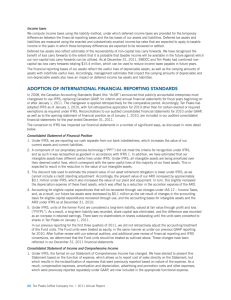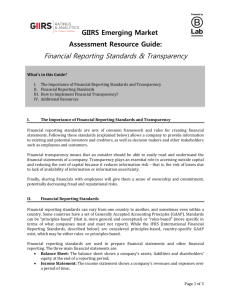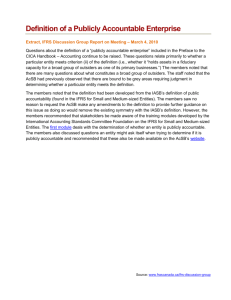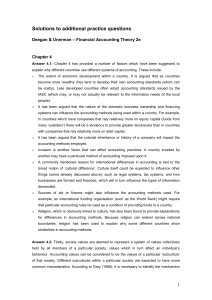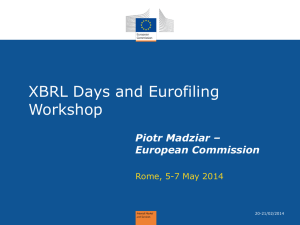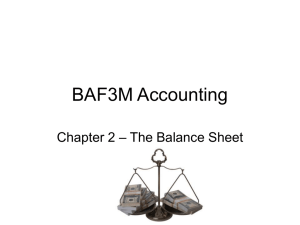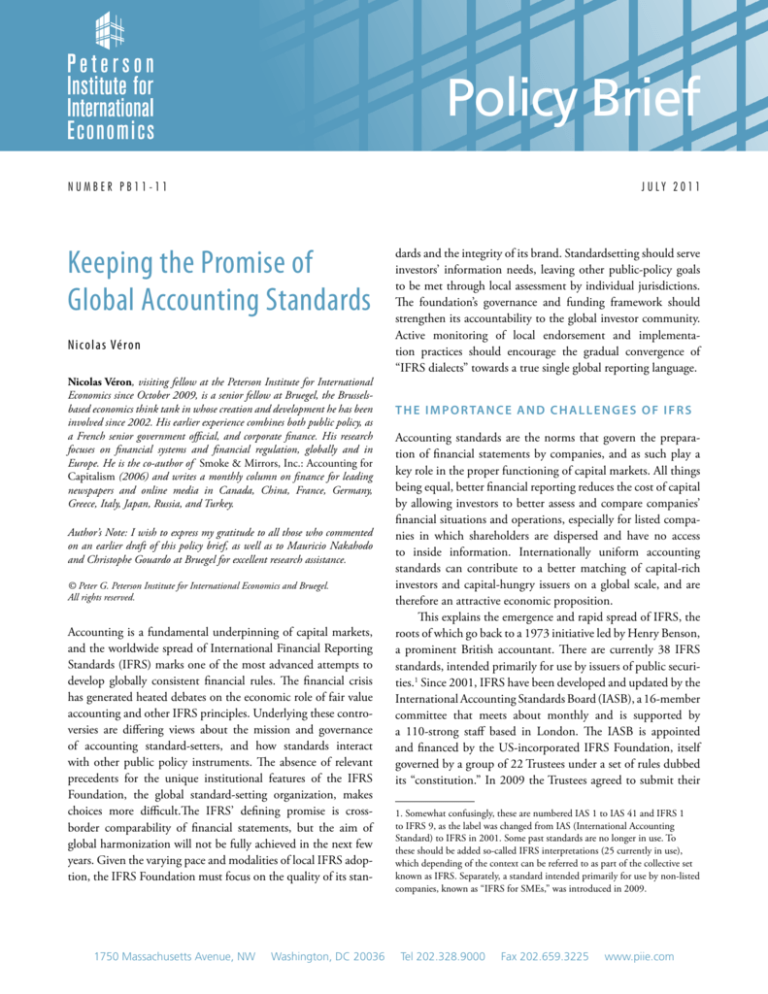
Policy Brief
Number PB11-11
July 2011
Keeping the Promise of
Global Accounting Standards
N i colas Véron
Nicolas Véron, visiting fellow at the Peterson Institute for International
Economics since October 2009, is a senior fellow at Bruegel, the Brusselsbased economics think tank in whose creation and development he has been
involved since 2002. His earlier experience combines both public policy, as
a French senior government official, and corporate finance. His research
focuses on financial systems and financial regulation, globally and in
Europe. He is the co-author of Smoke & Mirrors, Inc.: Accounting for
Capitalism (2006) and writes a monthly column on finance for leading
newspapers and online media in Canada, China, France, Germany,
Greece, Italy, Japan, Russia, and Turkey.
Author’s Note: I wish to express my gratitude to all those who commented
on an earlier draft of this policy brief, as well as to Mauricio Nakahodo
and Christophe Gouardo at Bruegel for excellent research assistance.
© Peter G. Peterson Institute for International Economics and Bruegel.
All rights reserved.
Accounting is a fundamental underpinning of capital markets,
and the worldwide spread of International Financial Reporting
Standards (IFRS) marks one of the most advanced attempts to
develop globally consistent financial rules. The financial crisis
has generated heated debates on the economic role of fair value
accounting and other IFRS principles. Underlying these controversies are differing views about the mission and governance
of accounting standard-setters, and how standards interact
with other public policy instruments. The absence of relevant
precedents for the unique institutional features of the IFRS
Foundation, the global standard-setting organization, makes
choices more difficult.The IFRS’ defining promise is crossborder comparability of financial statements, but the aim of
global harmonization will not be fully achieved in the next few
years. Given the varying pace and modalities of local IFRS adoption, the IFRS Foundation must focus on the quality of its stan-
1750 Massachusetts Avenue, NW
Washington, DC 20036
dards and the integrity of its brand. Standardsetting should serve
investors’ information needs, leaving other public-policy goals
to be met through local assessment by individual jurisdictions.
The foundation’s governance and funding framework should
strengthen its accountability to the global investor community.
Active monitoring of local endorsement and implementation practices should encourage the gradual convergence of
“IFRS dialects” towards a true single global reporting language.
T H E I M P O R TA N C E A N D C H A L L E N G E S O F I F R S
Accounting standards are the norms that govern the preparation of financial statements by companies, and as such play a
key role in the proper functioning of capital markets. All things
being equal, better financial reporting reduces the cost of capital
by allowing investors to better assess and compare companies’
financial situations and operations, especially for listed companies in which shareholders are dispersed and have no access
to inside information. Internationally uniform accounting
standards can contribute to a better matching of capital-rich
investors and capital-hungry issuers on a global scale, and are
therefore an attractive economic proposition.
This explains the emergence and rapid spread of IFRS, the
roots of which go back to a 1973 initiative led by Henry Benson,
a prominent British accountant. There are currently 38 IFRS
standards, intended primarily for use by issuers of public securities.1 Since 2001, IFRS have been developed and updated by the
International Accounting Standards Board (IASB), a 16-member
committee that meets about monthly and is supported by
a 110-strong staff based in London. The IASB is appointed
and financed by the US-incorporated IFRS Foundation, itself
governed by a group of 22 Trustees under a set of rules dubbed
its “constitution.” In 2009 the Trustees agreed to submit their
1. Somewhat confusingly, these are numbered IAS 1 to IAS 41 and IFRS 1
to IFRS 9, as the label was changed from IAS (International Accounting
Standard) to IFRS in 2001. Some past standards are no longer in use. To
these should be added so-called IFRS interpretations (25 currently in use),
which depending of the context can be referred to as part of the collective set
known as IFRS. Separately, a standard intended primarily for use by non-listed
companies, known as “IFRS for SMEs,” was introduced in 2009.
Tel 202.328.9000
Fax 202.659.3225
www.piie.com
Number PB11-11
NUMBER PB11-TBD
own appointments to mandatory approval by an ad hoc
group of public authorities called the Monitoring Board.2
Arguably the most important milestone so far in
the expansion of IFRS was the decision by the European
Union in 2000–02 to require their use by all listed
companies by 2005, in near-total consensus at the
time3. In its wake, other major jurisdictions have made
IFRS or variations thereof either mandatory in replacement of pre-existing national accounting standards, or
an optional alternative. In 2007, the US Securities and
Exchange Commission (SEC) authorized US-listed
foreign companies to use IFRS. However, domestic
US issuers still have to use the standards set by the US
Financial Accounting Standards Board (FASB), known as
US Generally Accepted Accounting Principles (GAAP).
Figure 1 illustrates how the IFRS’ “market share” among
the world’s largest companies has risen rapidly from
marginal to dominant, and how the EU has been joined
by other jurisdictions that together will soon represent the
majority of IFRS issuers.
Accounting standards, like any measurement and
disclosure framework, can influence the behavior of
economic actors, even if this is not the standardsetters’
intention. This helps explain the occasional intensity of
related controversies. Box 1 summarizes recent disputes
about the fair value accounting principle. Moreover, not
all accounting disputes are about fair value. In the United
States, for example, there were numerous controversies
about accounting standards for mergers and acquisitions
in the 1950s, leases and conglomerates in the 1960s, oil
exploration costs and inflation in the 1970s, pension obligations in the 1980s, and stock options in the 1990s and
early 2000s (Zeff 2005). Emissions trading permits are
also likely to give rise to heated future discussions in those
jurisdictions that adopt them, including the European
Union.4
The economic impact of accounting standards
has major implications. Standard-setters are generally
Figure 1 Adoption of International Financial Reporting Standards
(IFRS) among the world’s 500 largest listed companies
2. The Monitoring Board currently includes the chair of the US SEC,
the European Commissioner for the Internal Market, the Commissioner
of the Japanese Financial Services Agency, and two representatives of
the International Organization of Securities Commissions (IOSCO).
Further expansion of its membership is under consideration
(Monitoring Board, 2011).
3. The key corresponding legislation, Regulation (EC) No. 1606–2002,
was adopted by 492 votes in favor out of 526 by the European
Parliament, and unanimously by the Council.
4. The IASB has started discussion on a standard on emissions
trading schemes in 2009, currently on hold but expected to restart
later in 2011.
2
July 2011
Accounting standards used
percent
60
50
40
30
20
10
0
2003
2006
IFRS
2009
US GAAP
2012 (est.)
Other
Companies using IFRS, by country of headquarters
percent
90
European Union
80
Other EMEA
Asia/Pacific
70
Americas
60
EU
50
Ot
40
As
30
Am
20
10
0
2006
2009
2012 (est.)
US GAAP = US Generally Accepted Accounting Principles; EMEA = Europe, Middle East, and Africa
Source: FT Global 500 rankings, Datastream, author’s calculations. Standards that include some variations from pure IFRS, such as in the EU (see last section), are counted as IFRS in these graphs. Estimates
for 2012 are based on the 2009 sample of companies, assuming IFRS use in Brazil, Canada, Japan
(companies currently using US GAAP), Mexico, and South Korea.
N uU m
M bB eE rR P B 1 1 - 1T B1 D
J uU lL yY 2 0 1 1
Box 1 The fair value controversy1
The fair value accounting measurement principle (often referred to as “mark-to-market”) relies on market prices to determine
the book value of financial instruments. If there is no relevant market price, or if the market is not sufficiently liquid and/or deep,
then the book value is the market price of a similar instrument, and if this is also unavailable, it is based on a financial valuation
model, typically based on discounted cash flows. Both IFRS and US GAAP apply fair value measurement to some but not all
financial assets and liabilities. For example, financial instruments held for trading purposes are booked at fair value, while fixedincome instruments held to maturity are booked at amortized cost— i.e., booked at purchased cost and irreversibly impaired
when it no longer appears that they will be repaid to maturity. These measurement categories differ between IFRS and US GAAP;
however, under both sets of standards, the scope of fair value accounting (i.e., which assets and liabilities are measured at fair
value) currently corresponds to significantly less than half of the balance sheet for most financial institutions. For example, Laux
and Leuz (2010) estimate that about 36 percent of assets are reported at or close to fair value in large US bank holding companies, and that the corresponding proportion is much lower in smaller banks. In other terms, both sets of standards remain far
from “full fair value,” namely the measurement of all financial instruments according to the fair value principle.
At the start of the financial crisis in 2007-08, many financial executives called for the suspension of fair value accounting,
claiming that the sudden disappearance of liquidity from markets such as those for US mortgage-based securities had made
market price references for the value of their assets meaningless. At the height of the crisis in October 2008, EU policymakers
strong-armed the IASB into hastily amending their IAS 39 standard on financial instruments to allow financial firms to retroactively reclassify assets in order to escape the requirement to mark them to market prices, at a high cost in terms of perceptions
of the IASB’s integrity.2 Separately, in April 2009, the US FASB loosened its standard on financial asset impairments. The IASB
later adopted a new financial instruments standard (IFRS 9) that redefines the scope of fair value accounting, even though
whether the overall impact will be a restriction or expansion of that scope will depend on individual cases.
Numerous subsequent studies from public authorities and academics (e.g. Escaffre et al., 2008; SEC, 2008b; Novoa et al.,
2009; Coval et al., 2009; FCAG, 2009; Huizinga and Laeven, 2009; and perhaps most comprehensively Laux and Leuz, 2010)
concluded against blaming fair value accounting for accelerating the crisis. More specifically, these studies generally find that
fair value does not intrinsically generate financial instability, but that capital requirements that rely too directly on financial
accounting can result in harmful procyclical effects, and therefore they generally recommend “prudential filters” in regulatory
capital calculations to mitigate the effect of short-term accounting volatility on capital requirements, rather than “breaking
the thermometer” by reducing the scope of fair value in the accounting standards themselves. Dissenters (e.g. Bezold, 2009;
Marteau and Morand, 2009) fail to provide any empirical evidence for their harsh assessment of the fair value principle.
Perhaps more to the point, many high-profile calls for suspension of fair value were made in 2007 and early 2008, as the
market price of US mortgage-based securities and other assets, including AAA-rated ones, declined sharply, and financial
firms, trade associations and some regulatory authorities argued that market prices were artificially depressed by “fire sales”
and therefore should not be the basis for accounting measurements. For example, the Bank of England argued in its April
2008 Financial Stability Report that the prices of ABX indices, an oft-quoted reference for US mortgage-based securities (MBS)
based on a diversified basket of actual MBS transactions, were undervalued by 20 percent compared with in-house financial
models based on probabilities of default and losses given default. But these market price declines eventually appeared to be
justified by fundamentals, as most corresponding instruments continued to further lose market value later in 2008 and never
regained their mid-2007 or even early-2008 levels even as liquidity issues were resolved. The possibility of a bias in financiers’
perceptions is illustrated by the fact that the leading US advocate of suspending fair value accounting in early 2008 was Martin
Sullivan, then CEO of AIG.3
Even so, many leaders still view fair value accounting as a negative factor in the crisis, particularly in Europe (Sarkozy,
2010).
1. See also Véron (2008) for a more in-depth analysis of arguments over fair value.
2. The IASB’s chairman was widely reported as having come close to resigning at this occasion. See David Jetuah, “Tweedie nearly quit after fair value change,”
Accountancy Age, 12 November 2008.
3. See Francesco Guerrera and Jennifer Hughes, “AIG urges ‘fair value’ rethink,” Financial Times, March 14, 2008
3
percent of year’s revenue
Number PB11-11
NUMBER PB11-TBD
accounting professionals by background and see their role as
intrinsically technical, namely finding the best measurement and
disclosure principles for financial statements to give investors
the information they need. But corporate issuers tend to view
them like policymakers, and often attempt to influence them
accordingly. Auditors also have special interests in the process,
especially in those cases where the wording of the standards may
affect their future legal liability. Governments can have multiple
and sometimes conflicting public policy objectives beyond
the efficiency of capital allocation, such as using accounting
standards to influence corporate behavior, or leveraging their
control over the standard-setting process for their own information needs for tax, regulatory or statistical purposes, not to
mention the possibility of the occasional capture of public decisionmaking by private special interests which can be facilitated
by the arcane content of some accounting discussions. These
diverging perspectives imply that the quality of accounting
standards can only be considered in reference to a specific group
of stakeholders, rather than in absolute terms. They also explain
why the most intractable policy debates about IFRS relate to
the governance of the standard-setting process, i.e. to which
stakeholders it effectively gives priority.
The second half of 2011 will be particularly important in
shaping the future of IFRS, with:
Figure 2 The IFRS Foundation’s deficits and dependence
on “Big Four” audit networks
percent of year’s revenue
50
Operating profit/loss
40
Net profit/loss
Funding Gap before Big Four Contribution
30
20
10
2010
2009
2008
2007
2006
2005
2004
2003
2002
0
Source: IFRS Foundation’s Annual Reports (2002–09) and presentation on Financial Position
(April 2011, available on www.ifrs.org); author’s calculations.
nFinancial strains and the foundation’s increasing reliance on
voluntary funding from the “Big Four” global accounting
networks,5 as illustrated by Figure 2, which raise concerns
about independence and the medium-term viability of the
current funding model;
on July 1 by Hans Hoogervorst, a former Dutch
Finance minister and securities regulator; the trustees’s
chair is vacant since the death of Tommaso PadoaSchioppa in late 2010; and the Monitoring Board,
initially chaired by Hoogervorst, must also give itself a
new head.
nA commitment by the SEC to decide in 2011 on the adoption of IFRS by the United States (SEC 2008a). Harvey
Goldschmid, an influential Trustee, has argued that a
negative outcome or further delay “would likely have
tragic consequences” (Goldschmid 2010). Even with a less
dramatic assessment, this is potentially as important for
IFRS as the EU endorsement decision was a decade ago;
ACCO U N TA B I L I T Y AT T H E CO R E : A
CO N S I S T E N T G O V E R N A N C E F R A M E W O R K
Global organizations tend to fall into one of two main
categories. Those in the public sector, such as the United
Nations (UN) or the International Monetary Fund, generally have a state-based governance model which holds
them accountable to individual governments. Those in the
nMajor changes of leadership at all levels: the IASB’s
chairman for its first decade, David Tweedie, was replaced
5. Deloitte, Ernst & Young, KPMG, and PricewaterhouseCoopers.
4
Voluntary contribution of Big Four Audit Networks
2001
n Adjustments to be made to the IFRS Foundation’s governance,
in the context of a recent gradual loss of trust by key constituencies, including global investors particularly since the IAS 39
amendment of October 2008 (see Box 1). The trustees have
published a “Strategy Review Report” that proposes important parameters for future development (IFRS Foundation,
2011), and the Monitoring Board has launched a parallel
public consultation (Monitoring Board 2011);
July 2011
2
Number PB11-11
private sector generally have a stateless governance model that
involves either accountability to a community of stakeholders
not defined by nationality (such as corporations vis-à-vis their
shareholders, or global partnerships vis-à-vis their partners), or
no formal accountability mechanism other than reputational
(as in the case of many charities, NGOs and foundations, which
are essentially self-governed).
The IFRS Foundation started as a self-governed organization under a stateless governance model, embedded in its constitution as initially adopted in 2001. However, the foundation
subsequently made two major steps towards a state-based model.
n
First, in 2006 it adopted a new funding strategy based on
“non-voluntary contributions” calculated for each country
(and the European Union) in proportion to GDP. This
now partly implemented scheme makes the foundation
dependent on the support of each relevant government,
which has a monopoly on legal coercion to pay. It is thus
functionally equivalent to voluntary funding by governments, which gives them significant potential leverage.
nSecond, the 2009 creation of the Monitoring Board, to
which the trustees granted the control of their own selection
and reappointments, established this state-based group,
composed of representatives of individual governments
(and the European Commission), as the de facto highest
governing body of the IFRS Foundation. The consequences
of this major change are gradually unfolding.6
Unfortunately, this increasingly state-based model jars
with the IFRS Foundation’s mandate. The purpose of public
financial reporting is to correct information asymmetries to the
benefit of dispersed investors, an aim that has been confirmed
by both the Monitoring Board (2009) and the Trustees’ Strategy
Review Report. This primacy of investors (even if it remains
contested by some stakeholders, particularly in continental
Europe) calls for a stateless governance model that would
make the IFRS Foundation accountable to the global investor
community. This is because investors generally do not act on
the basis of territoriality and their interests cannot be properly
represented by individual governments, which typically tend to
favor the more powerful countervailing interests of corporate
issuers, or by national securities regulators, which are ultimately
accountable to their respective governments. Indeed, in most
advanced economies, governments have come to the conclusion
that high-quality accounting standards required an independent
6. The name of the Monitoring Board is a misnomer, as its powers already go
well beyond monitoring and can be expected to further expand in the future
(Monitoring Board 2011)—even though the Memorandum of Understanding
between the trustees and members of the Monitoring Board, that establishes
this transfer of power, can theoretically be revoked.
July 2011
standard-setter with dominant input from the private sector.7
A purely state-based model is bound to gradually transform
the IFRS Foundation into an “accounting UN” which would
permanently seek compromises between different understandings of the public interest (including the multifaceted concept
of “financial stability”) in different jurisdictions, and would find
it practically impossible to deliver standards that serve investors’ information needs. The corresponding deterioration of
the quality of IFRS may eventually result in the emergence of
competing standards preferred by investors, possibly causing a
new episode of fragmentation.
Conversely, the significant economic impact of accounting
standards implies that a purely stateless governance model
would be unrealistic. Therefore, the IFRS Foundation has to
invent an innovative hybrid of state-based and stateless models,
reflecting its unique global policymaking position in the absence
of a global government that could play the same role as governments do in national environments. The scattered nature of
the investor community, which has hindered the emergence of
organizations that would represent it at global level,8 represents
an additional difficulty which the Foundation can overcome
only by taking a proactive role of “community organizing.” Not
enough thought has been given so far to possible corresponding
options. Box 2 describes one imperfect, tentative scheme, to
which more debate could certainly bring improvements.
Other steps should also be considered to improve the
IFRS Foundation’s governance, particularly in terms of
geographical balance.9 The Monitoring Board’s public-sector
membership should be expanded to major emerging economies, and the European Union should be represented by the
European Securities and Markets Authority (ESMA) rather than
the European Commission, as securities regulators are generally
best placed among public authorities to understand and support
the IFRS Foundation’s mission to serve the information needs
of investors.10 The trustee level should be reinforced by making
the chair of trustees a full-time position, and by more clearly
separating their secretariat from the IASB’s staff. This secretariat
7. For example, in Canada, Japan and the United States, public authorities
have less direct control over national accounting standard-setters than the
Monitoring Board has over IFRS Foundation trustee appointments.
8. The CFA Institute and the International Corporate Governance Network
have a claim to represent global investors, but arguably not sufficient to be
formally embedded in the IFRS Foundation’s governance framework (N.B. the
author participates in committees of both these organizations).
9. For more detail, including a proposal for jurisdictions’ respective voting
power within the Monitoring Board, see the author’s responses to recent
public consultations (Véron 2011a and 2011b).
10. Simultaneously, financial regulatory bodies such as the Basel Committee
should further develop prudential ‘filters’ to mitigate the geographical distortions and procyclical impacts that may be induced by their capital and leverage
standards if these are too directly based on IFRS accounting.
5
N Uu M
m Bb Ee Rr P B 1 1 - 1T B1 D
Box 2
J Uu Ll Yy 2 0 1 1
A tentative proposal for investor representation at the top of the IFRS Foundation
The IFRS Foundation would put in place a global Investor Consultation Network, using Internet-based tools to
be able to directly consult individuals who are professionally involved in investment activities, with an adequate
process of voluntary registration and checking. This would serve as a sounding board to validate appointments of investor representatives, which only become effective after a sufficient number of network members
(representing a sufficient turnout) have endorsed them. The Trustees would appoint an Investor Representative
Selection Committee of, say, 15 individuals who command trust from the global investor community. Following
this initial appointment the committee would renew itself by cooptation, with all initial and subsequent appointments subject to validation by the Investor Consultation Network. The Investor Selection Committee would nominate Investor Representatives to the Monitoring Board (also subject to validation by the Network), whose number
would gradually increase and eventually represent the majority of the board.
Investing entities (such as asset management companies, investment funds, sovereign wealth funds, family
offices, etc.) would be encouraged to contribute to the IFRS Foundation’s financing on a voluntary basis. This
voluntary funding scheme would be more sustainable than the one adopted by the IFRS Foundation in the past, as
investors’ interests are more directly aligned than those of issuers with the IFRS Foundation’s mandate. Naturally,
such a voluntary funding mechanism, which would take significant time and resources to establish, could only
gradually replace the Foundation’s current funding model.
The constitution would be amended to make the Monitoring Board an integral body of the IFRS Foundation,
rather than an external group as it is now, and introduce qualified-majority voting rules for Monitoring Board decisions. The constitution would also make it a condition that trustees could only be appointed if their past experience gives credence to their commitment to high-quality standards that serve the needs of capital providers.
could be located in the Americas, and the monitoring board’s
secretariat in Asia, or vice versa. Geographical balance should
also be sought among the chairs of the Monitoring Board, the
trustees and the IASB.11
A D A P TA B I L I T Y O N T H E G R O U N D :
ACCO M M O D AT I N G T H E W O R L D ’S D I V E R S I T Y
Full global accounting harmonization is the promise of IFRS
and should remain the long-term goal. But it will not be reached
any time soon. China, India and Russia have made significant
steps towards IFRS but appear in no mood to renounce the
option of keeping some of their standards different. At the time
of writing, the United States seems likely to adopt an approach
colloquially known as “condorsement” (blend of “convergence”
and “endorsement”), under which some US standards would
only gradually converge towards their IFRS equivalents, while
others would be replaced by IFRS outright (SEC 2011). Japan
is widely expected to cautiously follow the steps taken by the
United States. Even the EU, in spite of its past pioneering
approach to IFRS, has often appeared to disagree with the
IASB in recent years and may not endorse all its standards in
11. In early October 2010, the last time all three positions were permanently
filled, they were all held by Europeans (respectively Hans Hoogervorst,
Tommaso Padoa-Schioppa, and David Tweedie).
6
4
the future.12 At least for some time, there will be several “IFRS
dialects,” some close to “pure IFRS” (all standards as adopted by
the IASB), some only remotely comparable.
As discussed in the previous section, IFRS standard-setting
should be focused on the information needs of investors, and
the IFRS Foundation cannot itself integrate multiple and occasionally divergent views of the public interest around the world.
This makes it legitimate that individual jurisdictions should be
able to not endorse all IFRS standards, if they believe they have
valid public-interest reasons not to. In the European Union,
Regulation (EC) 1606-2002 states that only standards that
“are conducive to the European public good” should be endorsed.
Most other jurisdictions have similar safeguard clauses or can be
expected to introduce them.
However, this discretion should not be abused. Crossborder comparability of financial statements is a global public
good that depends on maximum harmonization of accounting
standards.13 To avoid a harmful proliferation of IFRS dialects,
there should be proper incentives for convergence:
12. There is already one case of such divergence, as the European Union has
“carved out” (deleted) part of the IAS 39 standard on financial instruments
when endorsing it in late 2004.
13. As numerous studies have established, harmonization of accounting standards is not a sufficient condition for cross-border financial reporting comparability, which also depends on cultural and institutional factors including audit
quality and public enforcement. But it is a necessary condition nevertheless.
Number PB11-11
nFirst, jurisdictions that choose not to endorse a standard
should disclose the public interest motives underlying their
decision, and why such motives override the advantages of
convergence.
nSecond, if jurisdictions endorse a standard with modifications, they should not keep its IFRS name—for example, the
“carved-out” version of IAS 39 in the European Union should
be given a different, EU-specific label to avoid confusion.
nThird, translations into local languages should be subject to
stricter control and validation by the IFRS Foundation in
order to avoid low-quality translations, or diverging translations into the same language.14
nFourth, issuers should be clear about which set of standards
they are using, whether “pure IFRS” or the locally endorsed
“dialect,” and auditors and regulators should not tolerate
fuzziness—IOSCO has initiated efforts in that direction
but more needs to be done.
nFifth, all jurisdictions should allow the use of “pure IFRS” as
an alternative to the local “dialect,” and make it compulsory
for cross-border listings, possibly with limited “reconciliation requirements” as the United States has long required
from foreign issuers. The largest or most internationally
active companies in most jurisdictions would be likely to
opt for pure IFRS in order to better compare themselves
to their global peers, and this would enhance the status of
pure IFRS vis-à-vis local dialects.
The IFRS Foundation cannot impose such practices but
could encourage their adoption and monitor compliance,
naming and shaming free-riders and thus discouraging companies and countries from claiming adoption of IFRS when they
only “speak dialect.” More generally the foundation should
produce more detailed jurisdiction-level data on the status of
IFRS endorsement and use by various categories of companies, as part of an expanded research capacity (including on
the economic effect of IFRS), which is rightly called for by the
trustees’ Strategy Review Report.
In the case of the United States, the fifth proposal would
mean the coexistence of two sets of standards, with some US
companies using pure IFRS, and others using the modified
US GAAP under the “condorsement” approach, in other words
the US dialect of IFRS. Past and present examples including
Germany, Japan, Switzerland, and the United States itself with
the option given to foreign issuers since 2008 to use IFRS
instead of US GAAP, suggest this would be manageable.15
14. For example, the French translation of IFRS used in Canada has been
validated by the IASB, but the translation that has binding status in France is a
different version produced by the EU’s translation services.
15. A similar proposal has been made by Leuz (2011).
July 2011
Also, the SEC should endorse most IFRS standards early on,
and adopt the “convergence” approach only for a handful of
really contentious cases, which may include conditions for
asset impairments, definition of contingencies, some aspects
of financial instruments accounting (including the scope of
fair value accounting) and revenue recognition, research and
development accounting, and inventories. This would create
trust and a sense of commitment, and would also encourage
constructive approaches in other jurisdictions.
Flexibility will also be needed to determine which companies
should report under IFRS, beyond the large listed issuers whose
use of IFRS generates most of the benefits in terms of crossborder comparability. At least for some time, local accounting
standards could remain in use for non-listed and even possibly
smaller listed companies,16 and for single-entity (as opposed as
consolidated) accounts which are embedded in local corporate
and tax law and whose shift to IFRS can generate mismatches.17
Finally, comparability crucially depends on how the standards
are implemented and enforced. The Trustees’ Strategy Review
Report’s proposal that “the IASB will work with a network of
securities regulators, audit regulators, standard setters and other
stakeholders to identify divergence in practice” is a welcome
initiative in this respect. This may not preclude enforcement
authorities, such as the SEC in the US, from issuing local guidance on IFRS application, as long as such guidance does not
contradict IFRS. This amounts to local “accents” that would not
threaten the integrity of the IFRS “language,” even though it
would also incentivize the IASB to gradually amend its standards
and its own interpretations in order to reduce corresponding
regional differences. In the European Union, any corresponding
guidance should be issued by ESMA, which should also strongly
coordinate IFRS enforcement at the EU level. Such regional and
global efforts towards consistent implementation are necessary
complements to standards harmonization in order to maximize
the economic value of IFRS adoption.
The vision of full global harmonization of financial
reporting appears increasingly ambitious as the world gradually discovers the ramifications of IFRS adoption. Its ultimate
success is not guaranteed. But the prize, a globally unified
accounting language that can contribute to reducing the cost of
capital across the world, remains well worth the effort. With the
right combination of clarity of purpose, institutional creativity,
and flexibility on the ground, the IFRS promise can be brought
ever closer to fulfillment.
16. See Kevin Reed, “Allow small listed firms to duck IFRS,” Accountancy
Age, May 18, 2011. In the US context, one of the five SEC Commissioners
recently spoke in favor of IFRS adoption with an opt-out for “smaller reporting companies and other companies that have no international operations or
aspirations” (Casey 2011).
17. See Rose Orlik, “IFRS critics see momentum gathering,” Accountancy Age,
June 9, 2011
7
Number PB11-11
R eferences
Bezold, Andreas. 2009. The Subject Matter of Financial Reporting:
The Conflict between Cash Conversion Cycles and Fair Value in the
Measurement of Income. New York: Columbia Business School
Occasional Paper Series, May.
Casey, Kathleen. 2011. Keynote Address at the Society of Corporate
Secretaries and Governance Professionals 65th Annual Conference,
Colorado Springs, June 29, available on www.sec.gov.
Coval, Joshua, Jakub Jurek, and Erik Stafford. 2009. The Pricing of
Investment Grade Credit Risk during the Financial Crisis.mimeo,
Boston: Harvard Business School.
Escaffre, Lionel, Philippe Foulquier, and Philippe Touron. 2008. Juste
valeur ou non : un débat mal posé. Edhec Business School, November.
FCAG. 2009. Report of the Financial Crisis Advisory Group.report to
the IASB and FASB, July, available on www.ifrs.org.
Goldschmid, Harvey.2010. Regulatory Reform and IFRS at a Critical
Crossroad. keynote speech at the Financial Executives International
conference in New York, November 16, available on www.ifrs.org.
Huizinga, Harry, and Luc Laeven2009. Accounting discretion of banks
during a financial crisis. IMF Working Paper WP/09/207, September
IFRS Foundation.2011. Report of the Trustees’ Strategy Review - IFRSs
as the Global Standard: Setting a Strategy for the Foundation’s Second
Decade. available on www.ifrs.org (the “Strategy Review Report”).
July 2011
Monitoring Board. 2009.Statement on Principles for Accounting Standards
and Standard Setting. available at http://www.iosco.org/monitoring_
board/pdf/Monitoring_Board_of_IASCF_Statement_22092009.pdf .
Monitoring Board. 2011. Consultation Report on the Review of the
IFRS Foundation’s Governance. February, available at http://www.
iosco.org/monitoring_board/pdf/Review_of_the_IFRS_Foundation_
Governance_Report.pdf.
Novoa, Alicia, Jodi Scarlata, and Juan Solé. 2009 Procyclicality and Fair
Value Accounting. IMF Working Paper WP/09/39.
Sarkozy, Nicolas. 2010. keynote speech to the 40th World Economic
Forum in Davos, available on www.elysee.fr.
SEC 2008a. Roadmap for the Potential Use of Financial Statements
Prepared in Accordance with International Financial Reporting Standards
by U.S. Issuers. Securities and Exchange Commission Release No.
33-8982.
SEC. 2008b. Report and Recommendations Pursuant to Section 133 of
the Emergency Economic Stabilization Act of 2008: Study on Mark-ToMarket Accounting.
SEC. 2011. Work Plan for the Consideration of Incorporating IFRS
into the Financial Reporting System for U.S. Issuers: Exploring a Possible
Method of Incorporation.
Véron, Nicolas. 2008. Fair Value Accounting is the Wrong Scapegoat
for this Crisis Accounting in Europe 5:2.
Laux, Christian, and Christian Leuz. 2010. Did Fair-Value Accounting
Contribute to the Financial Crisis? Journal of Economic Perspectives 24:1.
Véron, Nicolas. 2011a. Response to the Trustees’ Strategy Review,
February 24, available on http://www.ifrs.org/NR/rdonlyres/86161C46D78A-46FB-9BC5-23C67139FF02/0/NicolasVeron.pdf.
Leuz, Christian. 2011. Accountants of the World Unite! Bloomberg
Business Class, June 24.
Véron, Nicolas. 2011b. Suggestions for reforming the governance of global
accounting standards. Bruegel Policy Contribution 2011/04.
Marteau, Didier, and Pascal Morand. 2009. Normes comptables et crise
financière. report to the French Minister of Economy, Industry and
Employment.
Zeff, Stephen. 2005 The Evolution of U.S. GAAP: The Political Forces
Behind Professional Standards The CPA Journal. available at http://
www.nysscpa.org/cpajournal/2005/105/infocus/p18.htm.
The views expressed in this publication are those of the author. This publication is part of the overall programs
of the Institute, as endorsed by its Board of Directors, but does not necessarily reflect the views of individual
members of the Board or the Advisory Committee.
8


